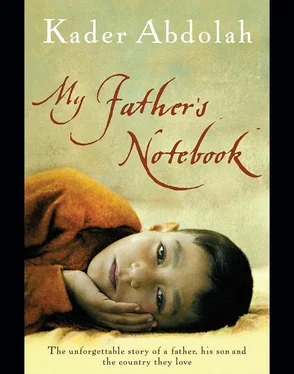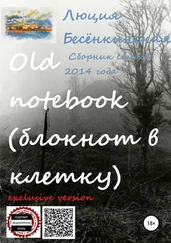“What else did you do in Isfahan? I mean, in the evenings and on the Fridays you had off? Tell me what you did when you weren’t mending rugs.”
“On Fridays I went to the mosque to pray. There were lots of people.”
“And afterwards?”
“I stayed there until it got dark.”
“And then?”
“And then I went up to the roof to look at the sky.”
“What else did you do?”
“When?”
“On the other nights? What did you do on the other nights?”
“I looked.”
“What do you mean? Did you spend every evening on the roof looking at the sky?”
“You see, here in my chest, on the left side, I felt something. I don’t know what, a kind of pain. No, not a pain. Something else. A feeling … how can I explain it? I wanted to go home.”
And at last he was allowed to go home.
“I got sick. I couldn’t mend carpets anymore. My head hurt. I used the wrong threads. Green instead of blue. That was bad. I went to the old man, laid my forehead on the back of his hand and wept.”
The old man brought Akbar to the station and sent him home. After a long trip the train stopped in the middle of the night at the station on Saffron Mountain. The conductor tapped Akbar’s shoulder to let him know he’d reached his stop. He got out and climbed up the mountain to begin a new life.
He started to go home, then suddenly took another path. After an hour of walking up steep mountains and down into deep valleys, he arrived at the house of the prostitute.
He knocked on her door. She didn’t open it. She was afraid it might be a drunk. He knocked again. Still she wouldn’t open the door. He called to her, “Aayaa yayayaya aaayaya ya ya aya aya ya.”
“Is that you, Akbar?” she called from above. She opened the door, threw her arms around him and led him inside. He spent the night with her and all of the next day. Only when evening came did he finally go home.
The next morning Aga Akbar stood in the town square and talked to the men about Isfahan. They stared at his fingers. The dyes that had discoloured his fingertips were very different from the ones they used. Isfahan’s blue had taken on the colour of its sky, its yellow had been borrowed from its ancient stones and its green was not at all like the grassy green of Saffron Mountain. Everyone realised that Akbar had learned new techniques, that he’d picked up Isfahan’s styles.
Later he applied these techniques to his business. People now welcomed him into their homes more than ever.
Had an ember fallen on your rug? No problem, Aga Akbar will mend it, he’ll work his magic and make the hole disappear. Had a rat gnawed its way through the bride’s dowry carpet? Don’t worry, don’t cry, we’ll go and get Aga Akbar!
People received him in their homes as if he were an aristocrat. He behaved like a true craftsman, a man who was proud of his work. He never went anywhere without his leather satchel, the one he’d brought with him from Isfahan. He rode with it slung over his shoulder. When he went into someone’s house, he tucked it under his arm, exactly as old Shamsololama had always done, threw back his shoulders and gestured, “Where’s the carpet?”
One time Ishmael asked Kazem Khan, “Why did you make my father learn that particular craft?”
“You see, my boy, carpet-weaving wasn’t actually a suitable occupation for us. Even the women in our household didn’t weave. It was the kind of thing that ordinary villagers did, farmers who had nothing else to do on long winter nights. I thought it would be the right job for him, but I soon realised it would make him miserable. He had to be free, he had to be able to get away. He wasn’t the kind of man who could spend years working on a single rug. He needed a job that could be done in a few hours, so that he could just get up and leave. That’s how I hit upon the idea of having him become a carpet-mender. It’s not boring work. In fact, it’s quite interesting. You have to use your head. You have to be an artist. Do you know what I mean? And I knew that your father had an artistic mind.”
“An artistic mind?”
“Yes, that of an artist, or a designer, or a … How can I explain it? People didn’t think in such terms in those days. You were supposed to work, weave, mow, plough, earn a living. What would you have done if you’d been in my position? Carpet-mending, my boy, that was the best kind of work he could do. There’s always a damaged carpet somewhere. He got to travel all over the place. It allowed him to earn a living and to express himself as an artist: to weave, dye, embellish and design. He could work his thoughts into the carpet.
“Your father was an illiterate, deaf-mute poet. I’ve told you that before. He needed to channel his thoughts into something, whether it was a cuneiform notebook or a hole in a carpet.”
• • •
And so, with his notebook in his pocket and his satchel on his back, Akbar rode from one village to another.
No one knew when he wrote in his notebook, or what he wrote about. He and his notebook were inseparable. It had become part of him, like his heart, which went on beating though no one paid any attention to that, either. Only Ishmael knew when his father was writing in his notebook. He knew that his father needed to write about the things he didn’t understand or wasn’t able to explain in sign language. Inaccessible, incomprehensible, intangible things that suddenly struck him and caused him to stare helplessly, or to stand transfixed, or to sit down and ponder. Death, for example, or the moon, or the rain, or the sacred well, or love, that indescribable process going on in your heart. Or else incidents that had marked him for life. One of these incidents had taken place when he rode into the village of Sawoj-Bolagh.
Aga Akbar often told the story to Ishmael, who had a vague idea of what it was about. But he still couldn’t figure out exactly what had happened.
One time, when he was about ten or twelve, his father took him along on one of his walks.
“Where are we going?”
“Hurry up,” his father signed. “A friend of mine lives up there. He can tell you the story. He knows all about it.”
“Which story?”
“The story about my military service. You know the one I mean. Hurry up, the faster you walk the sooner we’ll get there.”
To tell you the truth, Ishmael didn’t really want to climb the mountain. After an hour and a half, they reached a village, but Akbar kept going. Darkness was falling and the villagers were starting to light their lanterns.
“Now where are we going?” Ishmael moaned.
“Hurry up. We’re going to that farm. Can you see it? Over there, where that light is.”
Akbar hadn’t realised that the climb might be too difficult for Ishmael. That a city boy might not be as good a hiker as a village boy.
“Hurry up! We’re nearly there!”
After walking uphill for another half an hour, they finally reached the farm, which was guarded by a big, black, barking dog.
A farmer came to meet them with an oil lamp in his hand.
“Who’s there?”
Aga Akbar began shouting in his deaf-mute voice: “Aka, Aka, Akba, Akba, Is, Isma, Isma.”
“Is that you, Akbar? Salaam aleikum! Hello, young man, what’s your name? Come this way. Stop barking, dog, shoo! Come in.”
The dog disappeared into the darkness. They went inside.
“So, you’re Aga Akbar’s son, Ishmael. Allah, Allah, that’s good. I knew Aga Akbar had a son, but I didn’t know he had such a bright, decent-looking boy. It’s an honour to welcome you to my humble farm. Come on in, my boy. Yes, this is a real honour.”
He called to his wife, “Where are you? Come and look who’s here!”
The farmer’s wife came in. She looked in surprise at Aga Akbar, who had thrown his arm around Ishmael’s shoulder.
Читать дальше












